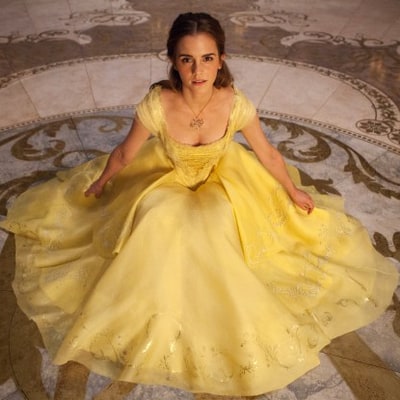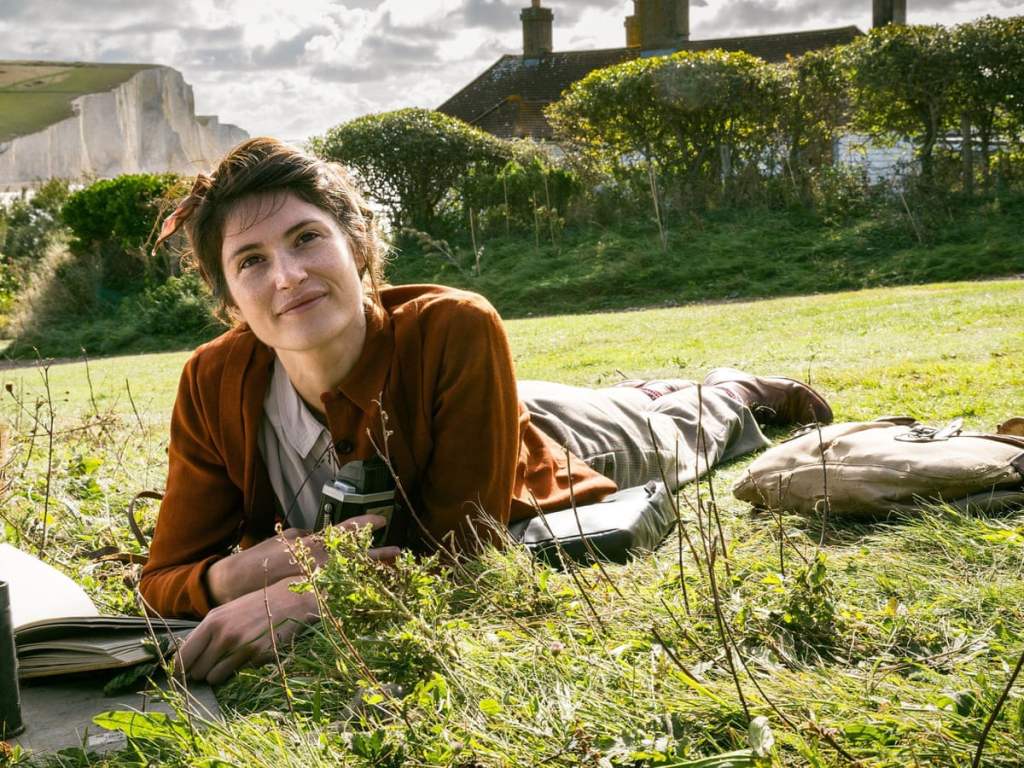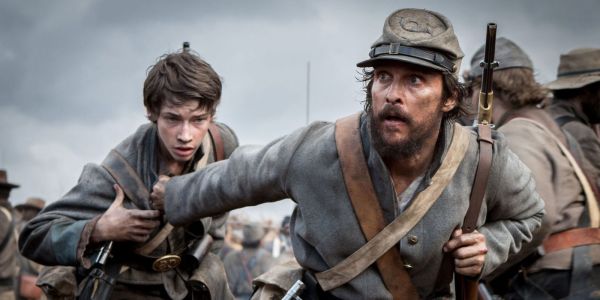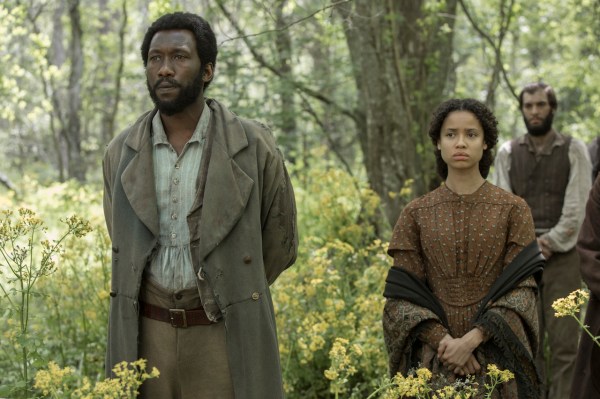One word: underwhelming.
This movie is production-designed within an inch of its life. Like, literally it’s clogged with lustre and decadence. I find no fault with how it looks; a good faith effort was made to pay tribute to the original, to remind us of the classic animated movie from 1991, while still forging its own little identity, diverging enough from the already-trodden path to inject it with a life of its own.
Unfortunately, none of the new material really lands. Is this just me, loyal to the film of my childhood? Sadly not. But it does pale in comparison. No matter what Bill Condon does, this film inevitably fails to capture the magic of the first. This is hardly surprising since it  eschews the magic of animation. Well, traditional animation. The truth is, “live action” or not, Belle is the only human being in that castle. Yes, Ewan McGregor danced around in a motion capture suit to play Lumiere, and Dan Stevens waltzed in steel-toed 10-inch stilts for the ballroom scene, but they’re both playing CGI characters. Why hire greats like Emma Thompson, Ian McKellan, and Audra McDonald, only to hide them behind computer graphics, appearing “live” only in the last 20 seconds of the film? It seems a waste. I rather liked the live action remake of Cinderella, but then, that was always a story about humans, wasn’t it? Jungle Book (which already has been) and Lion King (which is about to be) turned into “live action” films have little to no humans in them, so what’s the point? They were MADE for animation. Let’s leave them be.
eschews the magic of animation. Well, traditional animation. The truth is, “live action” or not, Belle is the only human being in that castle. Yes, Ewan McGregor danced around in a motion capture suit to play Lumiere, and Dan Stevens waltzed in steel-toed 10-inch stilts for the ballroom scene, but they’re both playing CGI characters. Why hire greats like Emma Thompson, Ian McKellan, and Audra McDonald, only to hide them behind computer graphics, appearing “live” only in the last 20 seconds of the film? It seems a waste. I rather liked the live action remake of Cinderella, but then, that was always a story about humans, wasn’t it? Jungle Book (which already has been) and Lion King (which is about to be) turned into “live action” films have little to no humans in them, so what’s the point? They were MADE for animation. Let’s leave them be.
Emma Watson, as Belle, is brilliant casting. She was originally cast in La La Land but left the project to do this instead. I think it was the right choice for her. Her voice is lovely and pure, and she reminds us that Belle isn’t just beautiful, but also smart and brave. Ryan Gosling was originally cast as the Beast and left this movie to do La La Land, and I think that was the right choice for him. Dan Stevens took over the role of the beast, and he’s okay. Director Bill Condon had hoped to create a beast look out of prosthetics, and he did film it that way, but in the end he was overruled and a CGI beast face was superimposed. Kevin Kline as Belle’s father, Maurice, is a wise choice. He’s older and less of a buffoon than in the animated film, but they don’t quite make sense of the character despite adding some back story. Luke Evans has the pleasure of playing everyone’s favourite cartoon narcissist, Gaston. No longer roughly the size of a barn, he’s still the cocky, selfsure Gaston we remember. It’s his sidekick who’s less recognizable.
The animated Le Fou is nothing more than a clown. In the 2017 version, Disney is proud to proclaim him their first openly-gay character, to which I say: hmm? This was maybe the movie’s biggest let down. Le Fou does not strike me as gay. He’s the kind of closeted gay that you only know about because it was issued in a Disney press release. What little humanity he shows already makes him too good for Gaston, but no real motivation is ever ascribed to him. It’s a Disney movie, so of course there is no real sexual tension, but nor is there even the slightest hint of romance or passion. There are more lingering glances between a young girl and a horned beast than there are between these two men. Nice try, Disney, but I’m not buying it. And it’s probably not the greatest idea to tout your first and only “gay character” as this bumbling idiot who languishes with an unrequited crush on a real prick, whom he helps to hook up with women. That’s pretty condescending.
But I take it back: Le Fou is not the most disappointing thing about the movie. In my little  girl heart, the biggest disappointment was The Dress. To me it looked cheap. And I’m sure it wasn’t: I’m sure that a dozen people toiled over its construction. I’ve heard it used 3,000 feet of thread, 2160 Swarovski crystals, and took over 12,000 designer hours to complete. Not worth it. The dress is disenchanting. In the original version, the dress is luminous, we believe it is not merely yellow, but spun gold. The one Emma Watson wears seems like a poor knock-off. It feels flat. And what’s with her shitty jewelry? In the cartoon, Belle’s
girl heart, the biggest disappointment was The Dress. To me it looked cheap. And I’m sure it wasn’t: I’m sure that a dozen people toiled over its construction. I’ve heard it used 3,000 feet of thread, 2160 Swarovski crystals, and took over 12,000 designer hours to complete. Not worth it. The dress is disenchanting. In the original version, the dress is luminous, we believe it is not merely yellow, but spun gold. The one Emma Watson wears seems like a poor knock-off. It feels flat. And what’s with her shitty jewelry? In the cartoon, Belle’s  neck is unadorned; why ruin a perfect neckline with even the most impressive of baubles? But Emma Watson’s Belle accessorizes her ballgown with a shitty pendant on a string. I can only assume this is blatant product placement and this cheap trinket will be sold en masse in a shopping mall near you, but it’s so incongruous it’s a distraction. For shame.
neck is unadorned; why ruin a perfect neckline with even the most impressive of baubles? But Emma Watson’s Belle accessorizes her ballgown with a shitty pendant on a string. I can only assume this is blatant product placement and this cheap trinket will be sold en masse in a shopping mall near you, but it’s so incongruous it’s a distraction. For shame.
And for all the little changes this movie makes, tweaks to the back stories and the plausibility, one glaring detail remains pretty much the same. In the 1991 movie, the wicked witch condemns the prince to live as a beast until he can love and be loved in return; if he fails to do so before the last petal falls from the enchanted rose, he will remain a beast forever, and his household staff will remain household objects. In the animated classic, we know that the beast has until his 21st birthday to make this happen, and that this has been a period of 10 years. Therefore, the curse bestowed upon him befalls him at age 11, and for what? Because he didn’t let a stranger inside the house while his parents were away? He’s ELEVEN! And his servants are blameless. It always struck me as an extremely cruel not to mention unfair punishment. In this recent film, the role of the witch is expanded, but this only makes her motivations murkier. We see how harshly she has condemned a young prince, but she seems to overlook much worse transgressions. If this is hard for me to swallow, I imagine it must be even more unsettling for children who need to know that rules and punishments are meted out fairly, at least.
I could not have skipped this movie, the pull was too great. But there was no childhood here to be relived, just a fraudulent imitation that had lost its sparkle.





 working on a theory about a tesseract, which would involve “wrinkling” time and space in order to travel through it. One dark and stormy night, a mysterious woman named Mrs. Whatsit appears to tell Meg, her friend Calvin, and Meg’s little brother Charles Wallace, the child genius, that she has heard her father calling out to them through the universe. Turns out, Mrs. Whatsit and her friends Mrs. Who and Mrs. Which are supernatural beings prepared to engage in a rescue mission.
working on a theory about a tesseract, which would involve “wrinkling” time and space in order to travel through it. One dark and stormy night, a mysterious woman named Mrs. Whatsit appears to tell Meg, her friend Calvin, and Meg’s little brother Charles Wallace, the child genius, that she has heard her father calling out to them through the universe. Turns out, Mrs. Whatsit and her friends Mrs. Who and Mrs. Which are supernatural beings prepared to engage in a rescue mission. make the book wonderful, but it also paints a fantastic picture that I cannot stop myself from going back to in my mind. The visuals are exotic and beautiful and the world-building just divine. I can only guess at the kind of impression it makes on young imaginations.
make the book wonderful, but it also paints a fantastic picture that I cannot stop myself from going back to in my mind. The visuals are exotic and beautiful and the world-building just divine. I can only guess at the kind of impression it makes on young imaginations. Julia Hart, the director and co-writer of Fast Color, almost had me fooled. She introduced Fast Color to the SXSW crowd as a story about motherhood, and in a way that’s true. Of course, in a way it is also true that the original Superman comics are about the experiences of Jewish immigrants. I mention Superman because both Fast Color and Superman use superheroes to tell their stories, although the movies’ respective approaches to the genre are worlds apart.
Julia Hart, the director and co-writer of Fast Color, almost had me fooled. She introduced Fast Color to the SXSW crowd as a story about motherhood, and in a way that’s true. Of course, in a way it is also true that the original Superman comics are about the experiences of Jewish immigrants. I mention Superman because both Fast Color and Superman use superheroes to tell their stories, although the movies’ respective approaches to the genre are worlds apart. she wants to know that he’ll be okay. But it’s creepy and invasive and neither Sam nor his prospective dates are super into this idea. Even Abbie’s support group is pretty skeptical. They’re also a pretty good source of humour in a movie that may have been overwhelmed by its maudlin theme. Thankfully the likes of Steve Coogan, Kate McKinnon, and Christopher Walken, all favourites of mine that I never dreamed would somehow end up sitting in the same little circle in the same film, go a long way to providing some comic relief.
she wants to know that he’ll be okay. But it’s creepy and invasive and neither Sam nor his prospective dates are super into this idea. Even Abbie’s support group is pretty skeptical. They’re also a pretty good source of humour in a movie that may have been overwhelmed by its maudlin theme. Thankfully the likes of Steve Coogan, Kate McKinnon, and Christopher Walken, all favourites of mine that I never dreamed would somehow end up sitting in the same little circle in the same film, go a long way to providing some comic relief. In The Whole Truth, Keanu does indeed play a lawyer who is defending the son of a former colleague and longtime friend. The son is accused of killing his father, that very same former colleague and longtime friend. I’m sure Keanu would like to believe that his client is innocent, but his client isn’t talking. And his client’s mother (Renee Zellweger) is mostly weeping, and begging Keanu to save her son’s life.
In The Whole Truth, Keanu does indeed play a lawyer who is defending the son of a former colleague and longtime friend. The son is accused of killing his father, that very same former colleague and longtime friend. I’m sure Keanu would like to believe that his client is innocent, but his client isn’t talking. And his client’s mother (Renee Zellweger) is mostly weeping, and begging Keanu to save her son’s life. eschews the magic of animation. Well, traditional animation. The truth is, “live action” or not, Belle is the only human being in that castle. Yes, Ewan McGregor danced around in a motion capture suit to play Lumiere, and Dan Stevens waltzed in steel-toed 10-inch stilts for the ballroom scene, but they’re both playing CGI characters. Why hire greats like Emma Thompson, Ian McKellan, and Audra McDonald, only to hide them behind computer graphics, appearing “live” only in the last 20 seconds of the film? It seems a waste. I rather liked the live action remake of Cinderella, but then, that was always a story about humans, wasn’t it? Jungle Book (which already has been) and Lion King (which is about to be) turned into “live action” films have little to no humans in them, so what’s the point? They were MADE for animation. Let’s leave them be.
eschews the magic of animation. Well, traditional animation. The truth is, “live action” or not, Belle is the only human being in that castle. Yes, Ewan McGregor danced around in a motion capture suit to play Lumiere, and Dan Stevens waltzed in steel-toed 10-inch stilts for the ballroom scene, but they’re both playing CGI characters. Why hire greats like Emma Thompson, Ian McKellan, and Audra McDonald, only to hide them behind computer graphics, appearing “live” only in the last 20 seconds of the film? It seems a waste. I rather liked the live action remake of Cinderella, but then, that was always a story about humans, wasn’t it? Jungle Book (which already has been) and Lion King (which is about to be) turned into “live action” films have little to no humans in them, so what’s the point? They were MADE for animation. Let’s leave them be. girl heart, the biggest disappointment was The Dress. To me it looked cheap. And I’m sure it wasn’t: I’m sure that a dozen people toiled over its construction. I’ve heard it used 3,000 feet of thread, 2160 Swarovski crystals, and took over 12,000 designer hours to complete. Not worth it. The dress is disenchanting. In the original version, the dress is luminous, we believe it is not merely yellow, but spun gold. The one Emma Watson wears seems like a poor knock-off. It feels flat. And what’s with her shitty jewelry? In the cartoon, Belle’s
girl heart, the biggest disappointment was The Dress. To me it looked cheap. And I’m sure it wasn’t: I’m sure that a dozen people toiled over its construction. I’ve heard it used 3,000 feet of thread, 2160 Swarovski crystals, and took over 12,000 designer hours to complete. Not worth it. The dress is disenchanting. In the original version, the dress is luminous, we believe it is not merely yellow, but spun gold. The one Emma Watson wears seems like a poor knock-off. It feels flat. And what’s with her shitty jewelry? In the cartoon, Belle’s  neck is unadorned; why ruin a perfect neckline with even the most impressive of baubles? But Emma Watson’s Belle accessorizes her ballgown with a shitty pendant on a string. I can only assume this is blatant product placement and this cheap trinket will be sold en masse in a shopping mall near you, but it’s so incongruous it’s a distraction. For shame.
neck is unadorned; why ruin a perfect neckline with even the most impressive of baubles? But Emma Watson’s Belle accessorizes her ballgown with a shitty pendant on a string. I can only assume this is blatant product placement and this cheap trinket will be sold en masse in a shopping mall near you, but it’s so incongruous it’s a distraction. For shame. the “free state of Jones”, made up of deserters, runaway slaves, and women, and they start their own mini rebellion against the corrupt Confederates in charge. The soldiers have been raiding local homes, taking their “10%” (more like 90), but leaving large plantations untouched. These people aren’t exactly hard to convince which side will benefit them most.
the “free state of Jones”, made up of deserters, runaway slaves, and women, and they start their own mini rebellion against the corrupt Confederates in charge. The soldiers have been raiding local homes, taking their “10%” (more like 90), but leaving large plantations untouched. These people aren’t exactly hard to convince which side will benefit them most. it lollygags from scene to scene, dwelling in weird places, then rushing through others. Perhaps Ross has simply bitten off more than he can chew, but you can see his good intentions shine through. What we need, though, is passion. It’s sadly lacking here. Even McConaughey’s strong performance is muddied by the white saviour characterization: Knight was a much more divisive figure.
it lollygags from scene to scene, dwelling in weird places, then rushing through others. Perhaps Ross has simply bitten off more than he can chew, but you can see his good intentions shine through. What we need, though, is passion. It’s sadly lacking here. Even McConaughey’s strong performance is muddied by the white saviour characterization: Knight was a much more divisive figure.